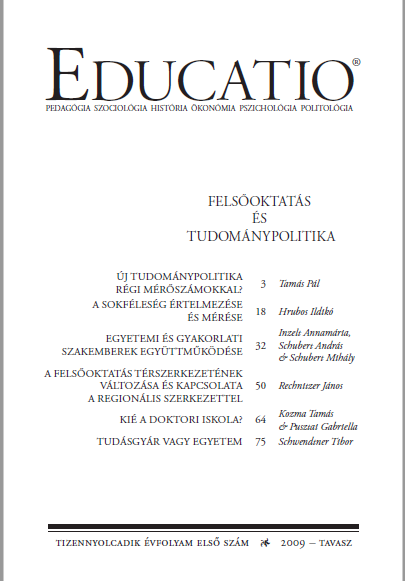Kié a doktori iskola ? – Egy akkreditáció visszhangja –
Who owns the doctoral school? The echo of an accrediatation
Author(s): Tamás Kozma, Gabriella PusztaiSubject(s): Gender Studies, Education, Higher Education , Evaluation research, Sociology of Education
Published by: Akadémiai Kiadó
Keywords: Doctoral school; Hungarian education; Academic degree; Research activities;
Summary/Abstract: Who owns the doctoral school? The echo of an accrediatation summarises the results of a questionnaire investigating the process of accreditation completed by members of Hungarian doctoral schools. In the course of the 2008 accreditation of the doctoral schools in Hungary, 577 senior lecturers were questioned on-line about their experiences and opinions of that process. 65 % of them were approved, 23 % approved temporarily, while 12 % of them were rejected by the HAC (the Accreditation Committee of Higher Education in Hungary). According to the lecturers, the most important criteria for being a supervisor in Hungary are: academic degrees (77%), on-going publication activities (71%), on-going research activities (63 %), participation in international academic activities (59 %) and international networking (50%). The overwhelming majority of the approved lecturers happened to be natural scientists, engineers and medical researchers. They belonged to the senior generation of university lecturers (between 51 and 70) and were mostly male teachers (81 %). Those rejected were mostly female, from the humanities and the social sciences with a typical age of 40. These results suggest that a) the criteria were mainly set by senior male members of the accreditation committees with a natural science background; b) the accreditation had a selective, rather than a supportive character with c) a strong concentration on the teachers rather than the students (and their opinions) of the doctoral schools. In view of the Bologna-process, the importance of an alternative accreditation process with a supportive rather than a selective character is stressed.
Journal: Educatio
- Issue Year: 18/2009
- Issue No: 1
- Page Range: 64-74
- Page Count: 11
- Language: Hungarian

